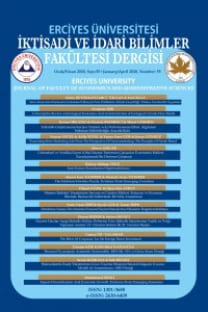TÜRKİYE’DE EMEK, SERMAYE VE ENERJİ ARASINDAKİ İKAME ESNEKLİĞİ: TRANSLOG ÜRETİM FONKSİYONU YAKLAŞIMI
ELASTICITY OF SUBSTITUTION BETWEEN LABOR, CAPITAL AND ENERGY IN TURKEY: TRANSLOG PRODUCTION FUNCTION APPROACH
___
- Aktaş, C. ve Yılmaz, V. (2008). Türkiye’de petrol tüketimi ve ekonomik büyüme arasındaki nedensellik ilişkisi, Kocaeli Üniversitesi Sosyal Bilimler Enstitüsü Dergisi, 15, 45-55.
- Brockway, P. E., Saunders, H., Heun, M. K., Foxon, T. J., Steinberger, J. K., Barrett, J. R. and Sorrell, S. (2017). Energy rebound as a potential threat to a low-carbon future: Findings from a new energy-based national-level rebound approach, Energies, 10(1), 1-24.
- Cassels, J. M. (1951). On the law of variable proportions. Erişim Adresi http://cas2.umkc.edu/ECON/economics/faculty/Lee/courses/502/reading/tp3.pdf .
- Çermikli, A. H. ve Tokatlıoğlu, İ. (2015). Yüksek ve orta gelirli ülkelerde teknolojik gelişmenin enerji yoğunluğu üzerindeki etkisi, Mustafa Kemal Üniversitesi Sosyal Bilimler Enstitüsü Dergisi, 12(32), 1-22.
- Christensen, L. R., Dale, J. W. and Lawrence, L. J. (1973). Transcendental logarithmic production frontiers, The Review of Economics and Statistics, 55(1), 28-45.
- Fang, Y. (2011). Economic welfare impacts from renewable energy consumption: The china experience, Renewable and Sustainable Energy Reviews, 15(9), 5120-5128.
- Ferguson, C. E. (1971). The Neoclassical Theory of Production and Distribution, Cambridge: Cambridge University Press.
- Frısch, R. (1965). The Theory of Production, Dordrecht: D. Reidel Publishing Co.
- Hepektan, E. ve Sertkaya, Y. (2016). Türkiye’de elektrik tüketimi, kişi başına GSYİH, CO2 emisyonu ve petrol tüketimi ilişkisi, Yalova Üniversitesi Sosyal Bilimler Dergisi, 6(12), 163-182.
- Hoch, I. (1955). Report of the montreal meeting, September 10-13 1954, Econometrica, 23(3), 324-337.
- Hoerl, A. E. and Kennard, R. W. (1970). Ridge regression: Biased estimation for nonorthogonal problems, Technometrics, 12(1), 55-67.
- Koesler, S. and Schymura, M. (2012),. Substitution elasticities in a CES production framework an empirical analysis on the basis of non-linear least squares estimation, Centre for European Economic Research, 12-007, Erişim Adresi: https://papers.ssrn.com/sol3/papers.cfm?abstract_id=2014655.
- Lin, B. and Ahmad, I. (2016a). Technical change, inter-factor and inter-fuel substitution possibilities in Pakistan: A trans-log production function approach. Journal of Cleaner Production, 126, 537-549.
- Lin, B. and Ahmad, I. (2016b). Energy substitution effect on transport sector of pakistan based on trans-log production function, Renewable and Sustainable Energy Reviews, 56, 1182-1193.
- Lin, B. and Atsaglı, P. (2017). Inter-fuel substitution possibilities in South Africa: A translog production function approach, Energy, 121, 822-831.
- Lin, B., Atsaglı, P. and Dogah, K. E. (2016). Ghanaian energy economy: Inter-production factors and energy substitution, Renewable and Sustainable Energy Reviews, 57, 1260-1269.
- Lin, B. and Xie, C. (2014). Energy substitution effect on transport industry of China-based on trans-log production function, Energy, 67, 213-222.
- Marschak, J. and Andrews, W. H. (1944). Random simultaneous equations and the theory of production, Econometrica, 12(3/4), 143-205.
- Mundlak, Y. (1961). Empirical production function free of management bias, Journal of Farm Economics, 43(1), 44-56.
- Özata, E. (2010). Türkiye’de enerji tüketimi ve ekonomik büyüme arasındaki ilişkilerin ekonometrik incelemesi, Dumlupınar Üniversitesi Sosyal Bilimler Dergisi, 26, 104-114.
- Pindyck, R. S. (1979). Interfuel substitution and the industrial demand for energy: An international comparison, The Review of Economics and Statistics, 61(2), 169-179.
- Pollak, R. A., Sickles, R. C. and Wales, T. J. (1984). The CES-translog: specification and estimation of a new cost function, The Review of Economics and Statistics, 66(4), 602-607.
- Sarı, R. and Soytaş, U. (2007). The growth of income and energy consumption in six developing countries, Energy Policy, 35(2), 889-898.
- Shen, K. and Whalley, J. (2013). Capital-labor-energy substitution in nested CES production functions for China. National Bureau of Economic Research w19104, Erişim Adresi: https://www.nber.org/papers/w19104.
- Smyth, R., Narayan, P. K. and Shi, H. L. (2011). Substitution between energy and classical factor inputs in the Chinese steel sector, Applied Energy, 88(1), 361-367.
- Songur, M. (2017). Türkiye’de beşeri sermaye ve fiziksel sermaye arasındaki ikame olanakları: Translog üretim fonksiyonu yaklaşımı, Çankırı Karatekin Üniversitesi İİBF Dergisi, 7(2), 201-224.
- Songur, M. (2018). Gelişmiş ve Gelişmekte Olan Ülkelerde Faktörler Arası İkame Esneklik Katsayısı: Cobb-Douglas, CES ve VES Üretim Fonksiyonu Tahmini (Yayınlanmamış doktora tezi). Gazi Üniversitesi Sosyal Bilimler Enstitüsü.
- Songur, M., Muratoğlu, Y. ve Şanlı, D. (2018). Türkiye’de Ekonomik Büyüme ile Enerji Tüketimi Arasındaki Nedensellik İlişkisi: Frekans Alanı Yaklaşımı. Cebeci, A. Torres, E. and Beken, H. G. (Eds.). Current Debates in Economics Volume 18 In (pp. 207-222). London: IJOPEC Publication Limited.
- Soytaş, U. and Sarı, R. (2007). The relationship between energy and production: Evidence from Turkish manufacturing industry, Energy Economics, 29(6), 1151-1165.
- Werf, V. E. (2008). Production functions for climate policy modeling: An empirical analysis, Energy Economics, 30(6), 2964-2979.
- Wesseh, P. K. Jr., Lin, B. and Appiah, M. O. (2013). Delving into Liberia's energy economy: Technical change, inter-factor and inter-fuel substitution, Renewable and Sustainable Energy Reviews, 24, 122-130.
- Yapraklı, S. ve Yurttançıkmaz, Z. Ç. (2012). Elektrik tüketimi ile ekonomik büyüme arasındaki nedensellik: Türkiye üzerine ekonometrik bir analiz, CÜ İktisadi ve İdari Bilimler Dergisi, 13(2), 195-215.
- Zellner, A., Kmenta, J. and Dreze, J. (1966). Specification and estimation of Cobb-Douglas production function models, Econometrica, 34(4), 784-795.
- ISSN: 1301-3688
- Yayın Aralığı: 3
- Başlangıç: 1981
- Yayıncı: -
AHİLİK TEŞKİLATI VE ANADOLU TÜRK ŞEHİRLERİNİN İKTİSADİ YAPISI: KAYSERİ ÜZERİNE BİR DEĞERLENDİRME
İŞ ANALİTİĞİ ve DEĞER ZİNCİRİ: DETAYLI ve SİSTEMATİK BİR LİTERATÜR TARAMASI
Emrah BİLGİÇ, Mehmet Ali TÜRKMENOĞLU, Gülgönül BOZOĞLU BATI
TÜRKİYE’DE EMEK, SERMAYE VE ENERJİ ARASINDAKİ İKAME ESNEKLİĞİ: TRANSLOG ÜRETİM FONKSİYONU YAKLAŞIMI
FİNANSAL İSTİKRARI SAĞLAMADA ULUSLARARASI REZERVLER ÖNEMLİ BİR ARAÇ MIDIR?
Ömer Erdem KOÇAK, Serkan EREBAK
CEP TELEFONU PAZARINDA MÜŞTERİ MEMNUNİYETİNİ ETKİLEYEN FAKTÖRLERİN ACSI MODELİYLE ARAŞTIRILMASI
Erkan ARI, Veysel YILMAZ, Gizem ÇELME KABAKÇI
İŞ YERİNDE DUYGUSAL TACİZ (MOBBİNG) VE YAŞAM DOYUMU İLİŞKİSİ: BURDUR İLİNDE BİR ARAŞTIRMA
Hüseyin ÇİÇEK, Hande AKDEMİR, Mehmet Ali TAŞ
